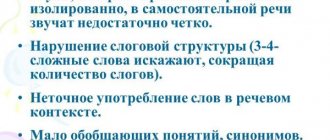What do we mean by speech impairment? The question requires thought, because it is not so easy to decide what is considered speech and at what age speech should be formed in a child. Scientists studying communications have come to the conclusion that many animals can communicate with each other. Dolphins, dogs, and primates have their own language. But speech as a means of verbal communication is accessible only to humans. Of course, provided that he is used to communicating from a very early age. To prevent you from growing up Mowgli, help your child develop speech! Should we sound the alarm if a 2-year-old child cannot construct a coherent sentence or is this normal for his age? But your parents tell you that you are his age... And your friend’s son already tirelessly chats with his parents all day long. How to understand where are individual norms and where are deviations and disorders of speech development? We will talk about this below.
Stages of development and formation of speech in a child
The skills and inclinations of a normally developing child directly depend on his age. But even in infants, experts are able to predict speech disorders in the future based on some signs. If motor development in the first year of life lags behind the norm, this is a possible sign that speech and mental development will also lag behind. We would also like to note that development standards were established in Soviet times and were quite strict. Now, unfortunately, many modern children do not meet them. Children of the new generation speak less and their speech takes longer to develop. The reasons for this are global “gadgetization” and the transition of people to virtual methods of communication.
| Age | Skills |
| up to 6 months |
|
| 6-9 months |
|
| 9 months-1 year |
|
| 1-1.5 years |
|
| 1.5-2 years |
|
| 2-3 years |
|
| 3-5 years |
|
Experts recommend regular examinations to identify delays, if any, as early as possible. One child is one of those who “harnesses slowly and rushes quickly.” He will start speaking later, but within a month he will catch up and surpass his peers. Then consider yourself lucky. But for another child, prolonged silence may hide such gloomy diagnoses as autism spectrum disorder, alalia and others. And it is very important not to miss them and start correction on time.
If you have any doubts about whether your child’s development rate is within the normal range, it is better to visit a specialist. What if he has a general
speech disorder
(general speech underdevelopment - GSD) or delayed speech development (SDD)?
For a child with severe speech impairment
It is often difficult to perceive the world around us positively. He grows up as a gloomy beech, touchy and aggressive, feels insecure, and with age begins to feel his inferiority. You can read more about the symptoms and degrees of speech underdevelopment here. Consult with specialists! Both minor and more significant speech deviations are usually identified in the first few years of life as a result of comprehensive diagnostics.
The spheres and areas of responsibility of specialists in speech problems are distributed as follows:
- Speech therapist
: Consults from 1.5 years old, conducts classes from 2 years old. At the consultation, he makes a final diagnosis, if it is a disease, and refers to a neurologist if there are suspicions of disorders of a corresponding nature; - Speech pathologist
: works with non-speaking children; in case of delays in psycho-speech development and pre-speech diseases (alalia, autism spectrum disorder), it helps to “start” speech and develop other cognitive functions to the level of the age norm.
We are primarily talking about young children. also occur in adults
- due to a brain injury or stroke.
Their correction is carried out by speech therapists and aphasiologists. Sometimes speech impairment in schoolchildren
and adults remains from neglected/undertreated pronunciation defects in childhood.
Diagnostics
The tactics of diagnostic examination depend on the suspected cause of slurred speech. The algorithm consists of medical and pedagogical aspects: the first allows for nosological diagnosis, the second - to establish the leading mechanism and degree of speech dysfunction:
- Neurological diagnostics.
Indicated for patients with dysarthric disorders. Cerebral MRI is performed to visualize focal brain lesions. To assess the severity of paralysis and paresis of articulatory muscles, electrophysiological studies are used: ENG, EMG. - Dental examination.
Required for persons with edentia, jaw dislocation, or poor-quality prosthetics. Diagnostics may include X-ray of the TMJ, orthopantomography, CT scan of the jaws. To make prosthetics, impressions are made and diagnostic models are cast. - Audiological examination.
If slurred speech is due to hearing loss, an audiogram, otoacoustic emissions, and auditory recordings are performed. An audiologist consults the patient with the test results. - Examination of the pharynx.
During pharyngoscopy, the peritonsillar abscess is visualized as a spherical, fluctuating formation. The mucous membrane is hyperemic, and pus can be seen through it in the place of greatest bulging. Sometimes a test puncture of the abscess is performed for differential purposes. - Speech therapy examination.
Assessment of the state of oral speech is necessary for dysarthria and rhinolalia. The speech therapist identifies articulatory difficulties, defects in sound pronunciation (substitutions, distortions, omissions), agrammatisms, and determines the coherence and intelligibility of speech.
Speech therapy classes
Types of speech disorders in children and adults
In speech therapy, several basic typifications are accepted - based on similar manifestations and sources. This helps to understand in which direction to look for the source of the problem and ways to correct speech impairment. Clinical and pedagogical classification
- Rhythm and tempo disorders: Stuttering (a deviation known since time immemorial. According to historians, the ancient Greek orator Demosthenes once suffered from a stutter, but persistently practiced making speeches by stuffing his mouth with small pebbles. Having learned to speak clearly with stones in his mouth, he developed an excellent articulation and self-confidence, thereby getting rid of the disease. Speech therapists still practice this method of correcting speech disorders).
- Dyslalia (in oral speech the child incorrectly pronounces or distorts individual sounds).
- Dysarthria (organs of articulation (lips, tongue) have critical limitations in mobility).
- Rhinolalia (reduced resonance in the nasal cavity).
- Other articulation disorders: polternium, tachylalia, bradyllalia.
- Aphonia (loss of a clear voice, a person speaks in a whisper. Problem with the vocal cords).
- Structural-semantic disorders: alalia (occurs during childbirth when the speech areas of the brain are damaged. At the same time, the child is fine with intelligence and hearing), aphasia (a similar problem. Organic lesions of the areas of the cerebral cortex that are responsible for controlling speech , and the adjacent “subcortex". It differs from alalia in that it is not a congenital phenomenon, but an acquired one - in people who can already speak. Usually occurs as a result of a stroke in adults).
- Dyslexia (difficulty perceiving written text, mixing sounds and words when reading, inability to form letters into ready-made words).
Psychological and pedagogical classification of speech disorders
- violations in the use of communication means stuttering
- other complications
- phonetic-phonemic speech underdevelopment
How to deal with “unruly” tongue?
Often a child does not pronounce all sounds due to the fact that his articulatory apparatus is simply not mature. You can do corrective games and exercises at home or with a speech therapist, gymnastics for the tongue and fingers, and breathing exercises. By the way, whistles and soap bubbles are not just fun, they also help develop articulation.
There are various exercises for pronouncing whistling, hissing sounds, and the letter “r”. You must first try them yourself and make sure that the child sees the articulation of an adult - how exactly this or that phoneme is pronounced.
If a child is unable to pronounce a sound, he often comes up with a simpler substitute. And the adults begin to lisp along with him. There is no way to do this. “Incorrect” words and sounds are remembered for a long time, and it is very difficult to eradicate them later. The most important stage in the development of speaking is preschool, namely 3-6 years. You should talk to your child at this time:
- no baby talk;
- clearly, in order and legibly;
- short simple sentences;
- periodically repeating new words so that the little person remembers them;
- with different intonation and tempo, emotionally.
Causes of speech impairment in children
The deviation can be congenital or acquired, physiological or purely psychological. The choice of correction method directly depends on this. Once upon a time, ideas about the sources of speech anomalies were quite chaotic. Professor Mikhail Khvattsev, one of the pioneers in speech therapy among our compatriots, made a major contribution to the systematization of the causes. He divided them into internal and external and introduced the following classification:
- organic (anatomical-physiological, morphological): organic central (brain lesions);
- organic peripheral (defects of hearing or articulation, cleft palate, dental defects);
- functional (psychogenic - problems with excitation and inhibition in the central nervous system);
Trouble does not come alone; problems on any front will inevitably grow into a whole bunch of accompanying complications. Khvattsev emphasized the close connection between organic and functional causes. If the sensory organs do not work properly, natural reflexes are poorly established. And vice versa, if there are already problems of a functional nature, then the development of organs will also slow down. Like the affected central nervous system, it does not contribute to the development of the periphery.
Depending on the stage at which the basis for speech dysfunctions arose, they are divided into:
- hereditary. Unfortunately, we do not always inherit a strong body from our parents. Children get many troubles “as a gift”, sometimes it is stuttering, various disorders of the speech zones in the cerebral cortex, problems with bite or the wrong number of teeth, defects in the palate, anomalies in the structure of the organs of articulation.
- congenital (intrauterine). Caused by complications during pregnancy. If a woman works in a hazardous industry, delays maternity leave until the last minute or unsuccessfully tries to terminate a pregnancy, if the embryo is forced to drink alcohol, tobacco and strong drugs with the mother, then all this will never benefit the baby. The first trimester is especially important, when the central nervous system is formed in the fetus.
- perinatal (birth) and postnatal (appear soon after birth). They arise due to complications during the very birth of the baby, due to premature birth, as a result of birth injuries, etc.
- others (manifest in the first years of a child’s life and later). Here the root of evil is either psychological, social and everyday factors, or serious illnesses (meningitis and other dangerous infections, diseases of the hearing organs, injuries to the brain and speech organs).
Please note: the risks to which a fetus is exposed at different stages of its development before birth, and an independent person after birth, are not the same. Obvious tips that mothers sometimes neglect:
- during pregnancy, take care of yourself more than usual, avoid injuries, shocks and the use of harmful substances;
- carefully choose a maternity hospital with modern equipment and skilled midwives;
- after birth, do not develop sores, even small ones, remember how vulnerable the fragile organism of a little man who has just come into this world is.
Prevention of speech disorders. Helping a child at home
To prevent violations and for the general development of speech, constant communication is needed. Otherwise, problems will arise sooner or later, even if there were no medical prerequisites initially. A child learning a language must practice through regular contact with native speakers. And the carriers are you. Communication is an integral part of the education program.
What's useful:
- read together with your child, talk about what you read, illustrate the plot together, discuss the drawings;
- sing songs together;
- listen to the little why, without interrupting, answer his questions about the world around him, teach him to listen to others;
- correct errors in the pronunciation of words and sounds, find the correct analogues for “baby” words and “lisping” (“bobo”, “kaka”).
Mistakes that many people make, but I want to believe you don’t:
- the child’s questions are answered with the general “when you grow up, you’ll know” and “because it ends in U”;
- do little socializing and reading aloud; so that the child is not distracted from his work, they turn on cartoons for the whole day and leave him alone with the TV or computer;
- They repeat with tenderness after the baby everything that he babbles, thereby contributing to the reinforcement of incorrect words and illiterate pronunciation - they impoverish the speech of the future native speaker of the Russian language.
From a “technical” point of view, breathing exercises and tongue exercises are always beneficial. Breathing can be trained using play methods that are interesting to the child: blowing soap bubbles and balloons, learning to play toy flutes and harmonicas. There are standard articulation exercises for practicing various problem sounds, when the tongue, lips and teeth are held for 10-20 seconds in certain positions:
- sound “R” - mouth wide open, tongue at the upper jaw, tapping on the teeth while pronouncing the sound “D”;
- hissing - the lips are extended forward as much as possible, the jaws are closed;
- whistling - the end of the tongue rests against the front teeth of the lower jaw, and the edges against the far teeth of the upper jaw.
When we are talking not about prevention, but about the correction of already established deviations, the work is carried out more deeply, according to individual programs, with the regular participation of a speech therapist. If your child has clear signs of a speech disorder, but you cannot understand the reasons and what to do next, we suggest that you undergo a comprehensive diagnosis of speech disorders at our Center. To make an appointment for an examination and an appointment with a speech therapist, call tel. or use the online registration form on the website e.
BASIC PRINCIPLES OF OPERATION OF THE CENTER IN KURSK
The center practices an individual approach to each patient, personal selection of diagnostic and correction methods. The specialists treat everyone who comes to the clinic with care and very patience, and always provide feedback to the parents of young patients. Parents are also consulted and useful recommendations are selected. After each lesson, a positive result is noticeable.
The network employs real professionals in their field. They have knowledge, skills and experience, therefore, they can provide quality assistance in each specific case.
It is important to understand that effective elimination of speech disorders is very important for every person. After all, it is speech that allows you to find your place in society and achieve certain heights. Every person should have this opportunity. Don’t delay your visit, call, make an appointment for your child and give him a future.










